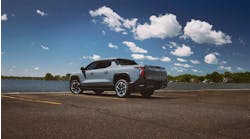Peterbilt makes electric 520EV truck available for 2021 orders
Peterbilt’s battery-electric Model 520EV work truck is now available for pre-order, the company announced this week in advance of an expected 2021 production schedule. The 520EV can be configured through the SmartSpec sales tool and ordered at local Peterbilt dealers.
The 520EV truck combines the features of the conventional Peterbilt 520 with the advanced technology of a zero-emission electric powertrain that will be available in two configurations to accommodate various applications.
“The Peterbilt Model 520EV is a big step towards turning our customers’ electrification dreams into reality,” said Jason Skoog, Peterbilt general manager and PACCAR vice president. “We believe the refuse and vocational space is a very important area for electrification and to have the first model readily available for customer orders is big win for Peterbilt.”
The fully integrated, all-electric powertrain of the Model 520EV is designed for optimal weight distribution and performance with a design that enables the thermally-controlled Lithium Iron Phosphate (LFP) battery packs to be configured in two different mounting schemes that are specifically designed for body integration with an automated side loader or a rear/front loader.
The Model 520EV features a range of 80-100 miles, including 1,100 bin cycles when used with an automated side loader or 130 compactor cycles with a rear loader refuse body. The state-of-the-art, high-energy-density LFP battery packs can recharge in three to four hours when using a recommended DC fast-charging system, making the 520EV ideal for the predictable routes seen in refuse applications.
The electric truck utilizes Meritor 14Xe e-axles to provide power to the wheels and is available as a tandem drive. The e-axle motors are outfitted with two-speed gearing and the e-axle wheel ends provide an additional 2:1 hub reduction, converting the power for comfortable driving speeds. Battery power is delivered to the e-axle motors through the drive inverters. Regenerative braking captures energy from stop-and-go conditions to recharge the batteries and help maximize the vehicle’s range.
The dash cluster of the Model 520EV provides the driver the gauge information required of an electric vehicle.



